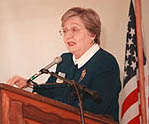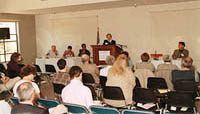![[Currents header graphic]](/homeart/currents_header.gif)
![[Currents header graphic]](/homeart/currents_header.gif)
May 17, 1999

|
|
Shirley Strum Kenny
|
Research can play an important role in improving undergraduate education at today's research universities, said the president of the State University of New York (SUNY) at Stony Brook at last week's Convocation on Teaching.
When universities institute a research-based approach to teaching, students become partners with faculty in the research enterprise and gain access to a wider body of knowledge, said Shirley Strum Kenny, who delivered the keynote speech at the May 11 convocation at the UCSC Arboretum.
"There's no longer just a finite body of knowledge to make people educated," she said. "There is so much information out there that a different emphasis is called for."

|
|
Improving undergraduate education was the focus of this year's Convocation on Teaching (more photos). Photos: Victor Schiffrin |
During her talk, Kenny discussed the work of the Boyer Commission on Educating Undergraduates in the Research University. Kenny chaired the commission, which proposed a new model of undergraduate education in a report it issued last year.
The report, entitled "Reinventing Undergraduate Education: A Blueprint for America's Research Universities," is a "call to arms," Kenny said. She added that many institutions have responded to the report; copies have been ordered from every continent in the world except Antarctica--and not just by research universities.
The Boyer Commission's report makes 54 recommendations for how undergraduate education can be improved. Several of those recommendations center on the important role research can play in education.
The Boyer report also calls for a different emphasis in teaching first-year students, Kenny said. Rather than simply giving these students remedial course work that repeats their high school experience, they should be exposed to ideas and materials they haven't seen before to get them excited about learning, she said. She called this idea "facing students toward the future."
After Kenny's address, UCSC faculty members John Isbister, Lynda Goff, and Tyler Stovall addressed the audience.
The provost of Merrill and a professor of economics, Isbister recommended that UCSC examine where it stands as an institution in relation to the recommendations made in the Boyer report. He also drew a distinction between universities as "archipelagos" made up of individual departments and universities as "ecologies made up of interrelating parts."
As a faculty, we should be looking at the educational process as a whole and not just thinking about the needs of our separate departments, he said.
Goff, associate vice chancellor for undergraduate education and a professor of biology, agreed with Kenny that research is the basis of learning. "It's discovery learning," she said," and there are lots of experiments happening all over campus." She called for connecting the different elements of the archipelago through a center for undergraduate research and service learning.The provost of Stevenson and chair of the History Department, Stovall led the audience into the discussion following the presentation by asking a number of questions: Who teaches at the research university? How do we measure teaching? How do we help teachers improve when there's a problem?
The convocation was cosponsored by the Office of the Associate Vice Chancellor for Undergraduate Education, the Committee on Teaching, and the Center for Teaching Excellence. More than 50 people, mostly members of the UCSC faculty, attended the annual event.